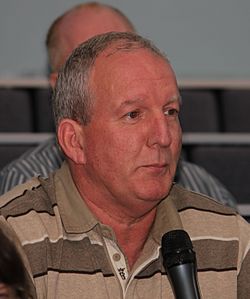Bobby Storey facts for kids
Quick facts for kids
Bobby Storey
|
|
|---|---|

Storey in 2012
|
|
| Born | 11 April 1956 |
| Died | 21 June 2020 (aged 64) Newcastle upon Tyne, England
|
| Political party | Sinn Féin |
Robert Storey (born April 11, 1956 – died June 21, 2020) was an important figure in Northern Ireland's history. He was a member of the Provisional Irish Republican Army (IRA), a group that aimed for a united Ireland. He also became a key leader in the Sinn Féin political party.
Bobby Storey spent about 20 years in prison during his life. He was involved in the famous Maze Prison escape in 1983. This was the biggest prison break in British history.
Growing Up in Belfast
Bobby Storey's family came from North Belfast. They had to move when he was very young. This was because of attacks by loyalist groups. These groups wanted Northern Ireland to stay part of the United Kingdom.
His family moved to Manor Street, which was a mixed area. Bobby's uncle, Gerry Storey, was a famous boxing trainer. His father, also named Bobby, helped protect their community.
Bobby was one of four children. He had two brothers, Seamus and Brian, and a sister Geraldine. His family had a history of supporting Irish republicanism. But Bobby said that events happening around him influenced him most. These included the McGurk's Bar bombing and Bloody Sunday (1972). These events made him want to join the IRA.
Bobby left school at age fifteen. He worked with his father selling fruit. At sixteen, he became a member of the IRA.
Time in Prison
On his seventeenth birthday, April 11, 1973, Bobby was arrested. He was held at Long Kesh internment camp. Internment meant being held without a trial. He had been arrested many times before, but was too young for internment.
In October 1974, he protested at Long Kesh. Prisoners set fire to their living areas. He was released in May 1975.
Bobby was arrested several more times in the 1970s. He was accused of bombings and shootings. But he was often found not guilty by judges. This was sometimes due to mistakes in police work.
In 1979, Bobby was arrested in London. He was accused of planning to hijack a helicopter. This was to help another IRA member escape prison. He was found not guilty in 1981.
Later that year, he was arrested with a rifle. This time, he was found guilty. He was sentenced to 18 years in prison. This was his first conviction.
The Maze Prison Escape
In 1983, Bobby Storey was a leader in the Maze Prison escape. This was a huge event. Thirty-eight republican prisoners broke out of the H-Blocks. It was the largest prison escape in Europe during peacetime. Bobby was caught within an hour. He was given an extra seven years in prison.
He was released in 1994. But he was arrested again in 1996. He was accused of having private information about a British soldier and a judge. At his trial in 1998, he was found not guilty. His lawyers showed that the information was already public.
Life After Prison
Bobby Storey spent over 20 years in prison. He was finally released for good in 1998. After his release, he became very active in politics. He helped develop the strategies for Sinn Féin. He eventually became the northern chairman of the party.
In 2005, a politician named David Burnside said something in the British Parliament. He claimed that Bobby Storey was the head of intelligence for the IRA. This was said under parliamentary privilege, which protects what politicians say in Parliament.
In 2015, Bobby Storey was arrested again. This was in connection with the killing of a former IRA member. He was held for two days. But he was released without any charges. His lawyer said Bobby would sue for unlawful arrest.
His Passing
Bobby Storey died on June 21, 2020. He passed away in Newcastle upon Tyne, England. He had undergone a lung transplant surgery that was not successful.
Sinn Féin president Mary Lou McDonald called him "a great republican." His funeral was held in Belfast on June 30. Over 1,500 people attended. Many important Sinn Féin leaders were there.
The funeral caused some discussion. This was because it happened during the COVID-19 pandemic. At that time, rules limited funerals to no more than 30 people. Many people felt the funeral broke these rules.
 | Selma Burke |
 | Pauline Powell Burns |
 | Frederick J. Brown |
 | Robert Blackburn |

